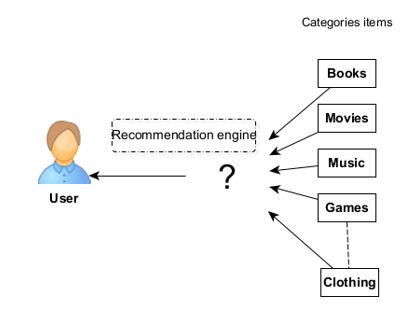News from the MCAA - Intelligent Recommendation System for online stores: An interview with Mariya Evtimova
Newsletter
In today's digital landscape, ‘Recommender Systems’ have gained immense popularity for their abilities to suggest relevant contents to the users. Dr. Evtimova’s research introduces a semantic e-shopping Recommendation System employing a ‘distributed belief’ algorithm. The innovative algorithm effectively combines diverse information, from user profiles, to offer personalized recommendations for their search queries.
Dr. Mariya Evtimova presented a talk about “Intelligent Recommendation System for online stores”, in the webinar organized by MCAA Career Development WG on 11thAugust, 2023. We interviewed her about her research in Big Data Management and Intelligent Recommendation systems.

Mariya Evtimova-Gardair
a personal account
Mariya Evtimova-Gardair is a Teaching & Research Assistant at Sorbonne University, Paris. She is also a visiting lecturer at Nepal College of Information Technology (NCIT, Nepal) and a COST project member. From 2019 to 2021, she worked as a research software engineer at National Research Institute for Agriculture, Food and the Environment (INRAE, France). Previously, she worked as an assistant professor at the Technical University of Sofia (Bulgaria) for 7 years. In 2017, she obtained her Ph.D. for the thesis titled “Semantic Agents for Personalized Search”. Her expertise not only includes computer science but also electronics. She has participated in various scientific projects related to AI, Information Retrieval (IR), semantics, multi-agent systems and reasoning. She has authored over ten publications, including two book chapters, and has participated in numerous invited presentations.
What is a Recommender System?

A Recommender System is an information filter, which suggests personalized recommendations, based on the user preferences and behaviors. Online suggestions of products, contents or services help the user to find relevant items from a large pool of options, enhancing their experience. These systems employ algorithms and data analysis to predict preferences using user behavior, item attributes and social networks. They are vital for e-commerce, streaming, social media and content platforms. Furthermore, their results are fundamental to enhance engagement, satisfaction and revenue through personalized experiences and reasoning algorithms.
What is a Semantic Reasoning algorithm?
A Semantic Reasoning algorithm leverages semantic information, like data meaning and context, to draw logical inferences and to make decisions. In Recommendation Systems for online stores, these algorithms improve the quality and relevance of product recommendations.
What are the advantages of using Semantic Reasoning in online store Recommender System?
Overall, using Semantic Reasoning algorithms in Recommendation Systems for online stores create more accurate, diverse and contextually relevant product recommendations. It helps to improve user satisfaction, engagement and conversion rates by presenting customers the products that match their preferences and needs, ultimately driving higher sales and customer loyalty.
What is the innovative technology that you propose?
I am proposing a new Intelligent Recommendation System and a new layered model of Semantic Intelligent algorithm for online stores. In particular, the proposed system will employ personalized user profiles for online stores. Furthermore, the new Semantic Model will use an innovative distributed reasoning algorithm, based on Disjunctive Belief Rule Base.
Why should it be important to use these new Intelligent Models and Systems?
There are several reasons to use them, like increasing the business performances of the online stores. If we want to analyze the reasons in detail, we can see:
• Improvement of Accuracy: New algorithms often incorporate advanced techniques and approaches that can lead to more accurate and relevant recommendations. This can enhance user satisfaction and loyalty.
• Personalization: New algorithms can capture individual user preferences better, leading to more personalized recommendations, tailored to each user's unique interests and behaviors.
• Overcoming Limitations: Existing Recommendation algorithms may have limitations such as data sparsity, cold-start problems or inability to handle certain types of data. New algorithms may address these issues and offer more robust solutions.
• Adaptability to Changing Environments: As user preferences and item catalogs evolve over time, new algorithms can be designed to adapt and continue to provide high-quality recommendations in dynamic environments.
• Diverse Recommendation Strategies: New algorithms can introduce diverse recommendation strategies, enabling users to discover a wider range of items and reduce the risk of recommending only popular or mainstream items.
• Enhanced User Engagement: By offering more accurate and relevant recommendations, new algorithms can increase user engagement and longer user sessions on the platform.
• Competitive Advantage: In highly competitive markets, utilizing state-of-the-art Recommendation algorithms can differentiate a platform from its competitors, thereby attracting and retaining more users.
• Scalability and Efficiency: New algorithms may introduce more efficient and scalable methods, making it easier to handle large datasets and provide real-time recommendations in high-traffic online environments.
• Business Performance: Improved recommendations can lead to higher conversion rates, increased sales and improved customer loyalty, directly impacting the business's bottom line.
However, it is essential to thoroughly evaluate and test new algorithms before deploying them in real data. A careful analysis of their performance, impact on the user experience and potential biases, is crucial to ensure that the new algorithm is suitable for the specific user case and target audience. Additionally, combining different algorithms or employing hybrid approaches may further enhance the Recommendation System's overall performance and adaptability.
Mariya Evtimova-Gardair
Teaching & Research Assistant
Sorbonne University in Paris
mevtimovagardair@gmail.com
Giulia Rizzo,
Postdoctoral researcher at INSERM
Chair of MCAA France Chapter
france.chapter@mariecuriealumni.eu
